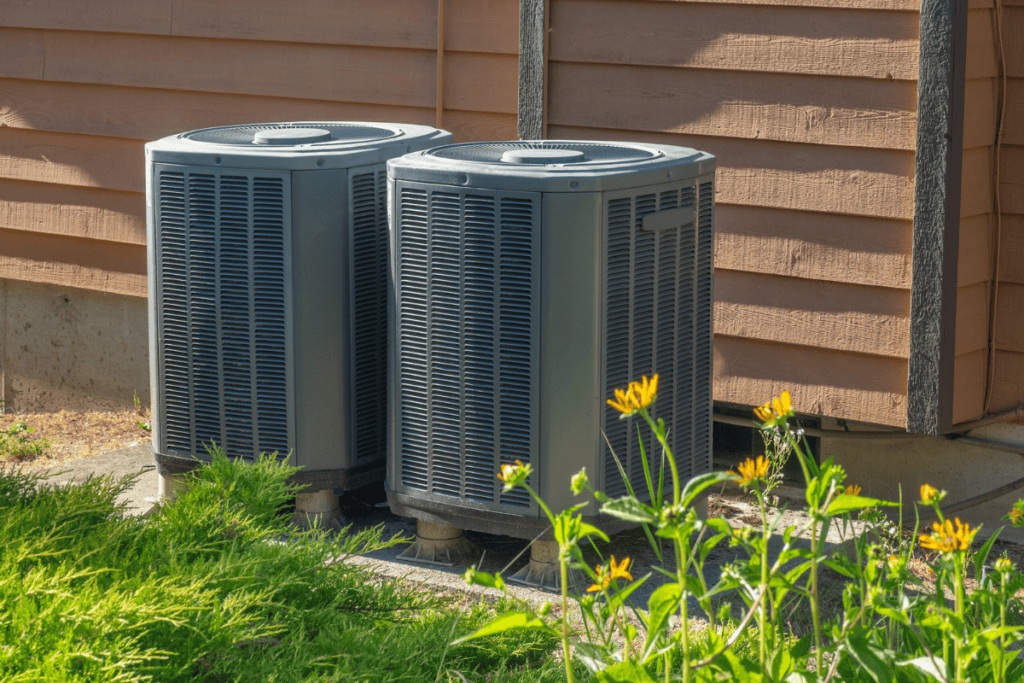The debate over whether to cover your air conditioner during the winter months has been a topic of discussion among homeowners for years. While some believe that covering their AC unit is necessary to protect it from the harsh winter elements, others argue that it’s not required.
Most HVAC professionals recommend not covering air conditioning units in any season, as they are designed to withstand extreme temperatures. However, various factors can influence the decision to cover your AC, such as the unit’s location, the climate you live in, and the type of cover you use.
In this article, we’ll explore the pros and cons of covering the unit in the winter and provide you with best practices to follow if you decide to cover your AC unit.
Contents
- 1 Benefits of Covering Your Air Conditioner
- 2 Cons of Covering Your Air Conditioner
- 3 What to Keep in Mind While Covering AC Unit in Winters
- 4 Alternative Winter Protection Methods
- 5 Contact HVAC Angel For AC Maintenance
- 6 Frequently Asked Questions
- 6.1 1. What happens if you run AC with cover on?
- 6.2 2. Can I use a tarp or plastic sheeting as a makeshift cover for my AC unit?
- 6.3 3. Can I cover both the outdoor and indoor components of my AC unit in winter?
- 6.4 4. Should I turn my air conditioner off in the winter?
- 6.5 5. What happens if you leave cover on air conditioner?
Benefits of Covering Your Air Conditioner
1. Protection from Debris and Dirt
Covering the air conditioner in the winter can help protect it from debris and dirt that may accumulate during the colder months. Leaves, twigs, and other debris can enter the AC unit and cause clogs or damage to the system’s components.
According to the U.S. Department of Energy, covering the outdoor unit of a central air conditioner will protect it from winter weather and debris.
2. Shielding from Snow and Ice
Winter weather can be harsh on your AC unit, especially if it’s exposed to snow and ice. Covering the air conditioner can help reduce the risk of rust and corrosion on metal components caused by moisture. It also prevents damage to external parts due to the weight and melting/freezing cycles of snow and ice.
3. Extending the Lifespan of the Unit
Investing in a cover for your air conditioning unit can provide general maintenance benefits by protecting it from environmental factors. This protection can result in long-term cost savings by reducing the need for repairs and replacements. By covering your AC, you can maintain its efficiency and performance over time, extending the lifespan of your HVAC system.
4. Prevention of Rust and Corrosion
In addition to protecting your AC unit from debris and snow, covers can also help prevent rust and corrosion caused by exposure to moisture and humidity. By keeping the air conditioner dry and shielded from rainwater, dew, and humidity, covers can mitigate the risk of rust formation on metal components, such as the compressor and condenser coils.
Cons of Covering Your Air Conditioner
1. Moisture Buildup
One of the main disadvantages of covering your unit in the winter is the risk of trapping moisture inside the unit. If the air conditioner cover is not breathable, it can create a damp environment that promotes mold and mildew growth.
According to the Centers for Disease Control and Prevention (CDC), exposure to mold and mildew can lead to various health problems, including respiratory issues.
2. Attracting Pests
Covering your AC unit during the winter can also attract unwanted critters, such as rodents and insects. The warm, sheltered space created by the cover may seem like an inviting home for these pests. Not only can they cause damage to your air conditioner by chewing on wires and nesting inside, but they can also bring additional debris into the unit, exacerbating maintenance issues.
The Environmental Protection Agency (EPA) warns that pests can spread or trigger serious, even fatal, diseases.
3. Potential for Overprotection
Many modern air conditioners are designed to withstand harsh weather conditions, including snow and ice, without the need for a cover. Using an AC cover might be an unnecessary expense and effort if the benefits do not outweigh the potential drawbacks.
Overprotecting your unit can also lead to complacency, causing you to neglect other important maintenance tasks, such as cleaning the air filters or scheduling regular HVAC repairs.
4. Risk of Improper Cover Use
Using an incorrectly sized or poorly fitted air conditioner cover can cause more harm than good. If the cover does not allow proper airflow, it can exacerbate moisture buildup and mold growth inside the unit. Poor quality covers may also deteriorate quickly, providing limited protection against the elements and damaging your AC unit.
5. Warranty Issues
Before using an aftermarket air conditioner cover, it’s important to check your manufacturer’s warranty. Some warranties may be voided if you use a cover that is not approved by the manufacturer. If any damage results from the use of an unapproved cover, you may be responsible for the repair costs, as they may not be covered under the warranty.
6. Additional Maintenance
Covering your air conditioning unit during the winter months adds an extra step to your seasonal maintenance routine. You’ll need to remember to put the cover on before the cold weather hits and remove it once the temperatures start to rise.
You’ll also need to find a proper storage space for the cover when it’s not in use, which can be an inconvenience for some homeowners.
What to Keep in Mind While Covering AC Unit in Winters
1. Material Quality
When selecting a cover for your outdoor air conditioner, it’s essential to choose a cover that is specifically designed to protect your AC unit in the winter. Look for covers made from breathable materials that allow proper airflow while still providing protection from debris and harsh weather conditions, including snow and ice.
A well-fitted cover that sits snugly around the unit without being too tight will help prevent moisture buildup and keep your system in good condition during the off-season.
2. Ventilation
Proper ventilation is important when covering your unit during the winter months. Opting for a breathable cover that allows air to circulate freely around the unit will minimize the risk of moisture accumulation, which can lead to mold growth and damage your air conditioner. Adequate ventilation also helps prevent the formation of ice and icicles that can cause harm to your outdoor AC unit.
3. Regular Inspection
For your air conditioner cover to provide optimal protection throughout the fall and winter, it’s important to perform regular inspections. Periodically check the cover for any signs of wear and tear, such as holes, rips, or loose-fitting areas.
Catching and addressing these issues early on will help maintain the cover’s effectiveness and prevent potential damage to your AC unit.
4. Storage
Proper storage of your AC cover during the hot summer months is just as important as using the right cover during the winter. When your air conditioner is in use, store the cover in a clean, dry place away from direct sunlight and moisture. This will help extend the life of your cover and make sure it’s ready to protect your outdoor AC unit when the cold weather returns.
Alternative Winter Protection Methods
1. Covering Only the Top of the Unit
Source: UBuy
One alternative to using a full air conditioner cover during the winter months is to cover only the top of the unit. This method helps protect your outdoor air conditioner from falling ice, snow, and debris while allowing proper airflow through the sides of the unit. This approach is particularly useful for those who don’t want to invest in a full AC cover but still want to protect their air conditioning system from harsh weather conditions.
2. Regular Maintenance and Inspection
Another way to keep your unit in good condition during the fall and winter is through regular maintenance and inspection. This involves cleaning the unit, removing any debris around it, and checking for signs of wear, rust, or damage. Regular maintenance also helps in making sure that your air conditioner is ready to handle the summer heat when the time comes.
3. Using a Protective Shelter
For those who want more robust protection for their outdoor air conditioner in winter, using a protective shelter is an excellent alternative to traditional AC covers. These shelters can be made from materials like wood or metal and are designed to shield your unit from snow, ice, and debris while still allowing proper ventilation.
By creating a protective enclosure around your AC unit, you can minimize the risk of moisture buildup and prevent rust, mold, and mildew from forming. When constructing a shelter, make sure it’s large enough to accommodate your entire unit without restricting airflow.
This method is ideal for homeowners in areas with particularly harsh winter weather conditions who want to make sure their air conditioning system stays in top shape year-round.
Contact HVAC Angel For AC Maintenance
At HVAC Angel, we understand the importance of maintaining your cooling system to so that it operates at peak efficiency and provides reliable comfort for years to come.
Our team of highly skilled and experienced technicians is equipped with the latest tools and technology to diagnose, repair, and maintain all types of air conditioners. We invest in ongoing training to stay up-to-date with the latest industry trends and best practices, ensuring that we provide the most effective solutions for your specific needs.
Whether you need assistance with covering your ac system for the winter, performing routine maintenance, or addressing any other HVAC concerns, our friendly and knowledgeable staff is here to help. We are committed to providing transparent, honest, and affordable services, focusing on building long-lasting relationships with our customers.
Don’t leave the health of your air conditioning system to chance. Trust the professionals at HVAC Angel to deliver the best possible care for your AC unit. Contact us today to schedule an appointment or to learn more about how we can help you maintain a comfortable, efficient home all year-round.
Frequently Asked Questions
1. What happens if you run AC with cover on?
Running your air conditioner with the cover on can lead to overheating, reduced efficiency, and potential damage to the unit. Always remove the cover before turning on your AC.
2. Can I use a tarp or plastic sheeting as a makeshift cover for my AC unit?
We don’t recommend using tarps or plastic sheeting as makeshift covers, as they can trap moisture and promote mold and mildew growth. Stick to covers specifically designed for AC units.
3. Can I cover both the outdoor and indoor components of my AC unit in winter?
No, you should only cover the outdoor unit (condenser) of your air conditioner. Covering the indoor components can lead to moisture buildup and damage.
4. Should I turn my air conditioner off in the winter?
Yes, it’s best to turn off your AC unit during the winter months when it’s not in use. This will help conserve energy and protect your system from unnecessary wear and tear.
5. What happens if you leave cover on air conditioner?
Leaving the cover on your air conditioner while it’s in use can obstruct airflow, causing the unit to work harder and potentially overheat. This can lead to reduced efficiency, higher energy bills, and even damage to your AC system.

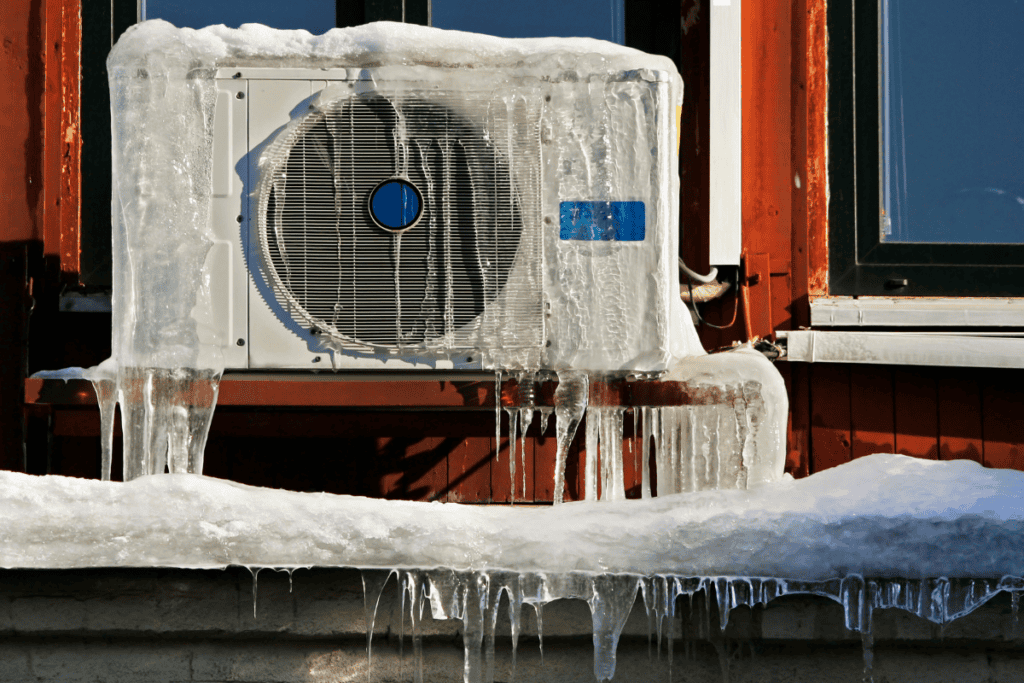
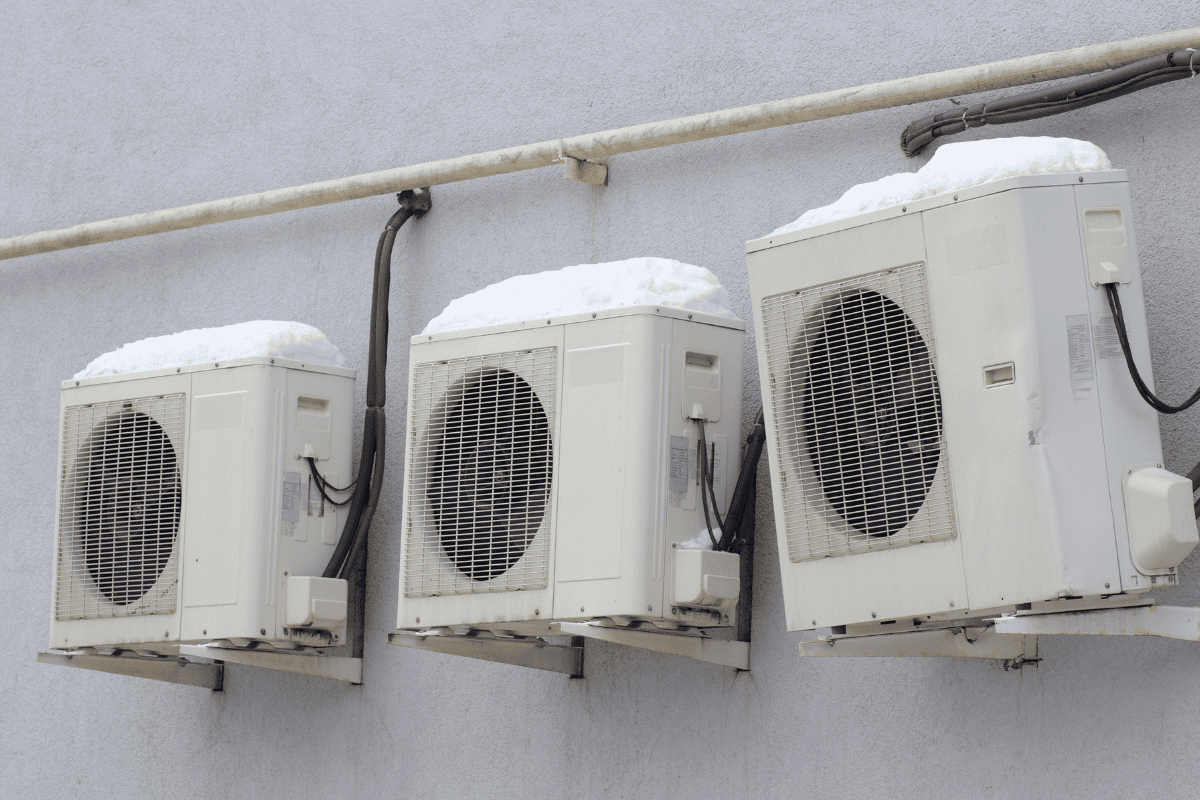
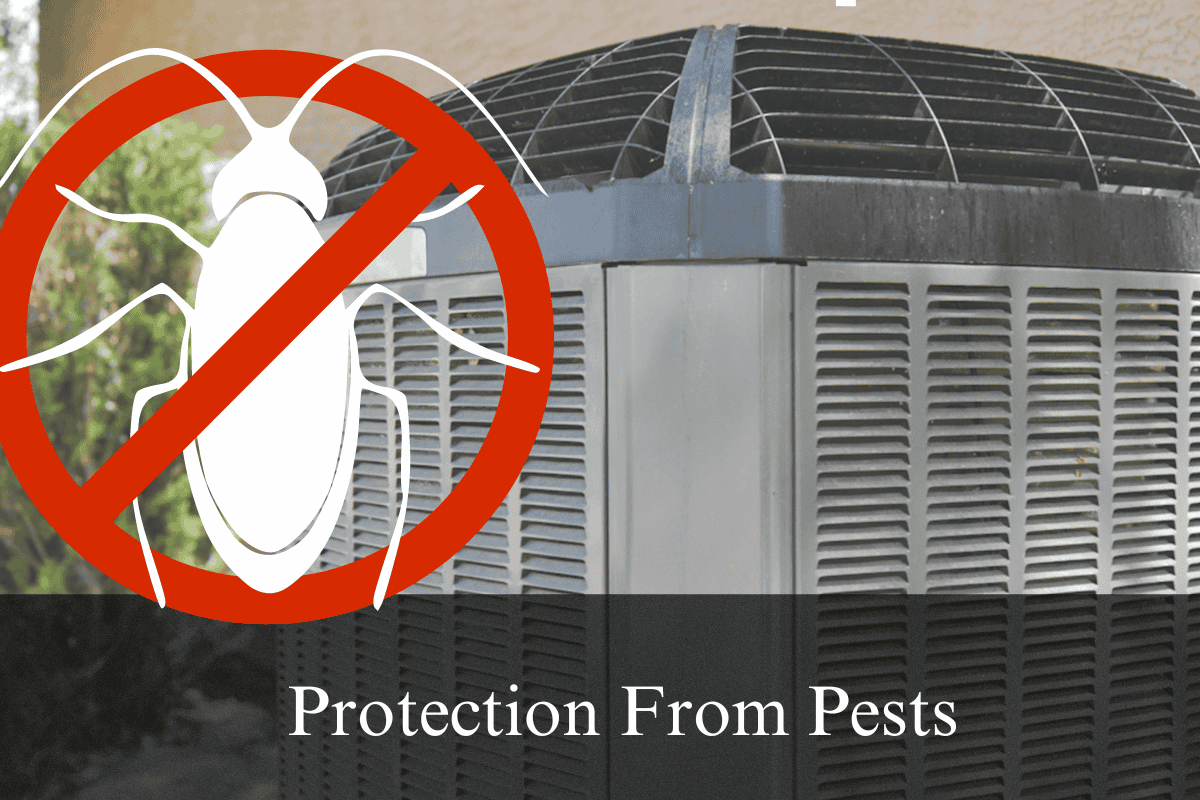
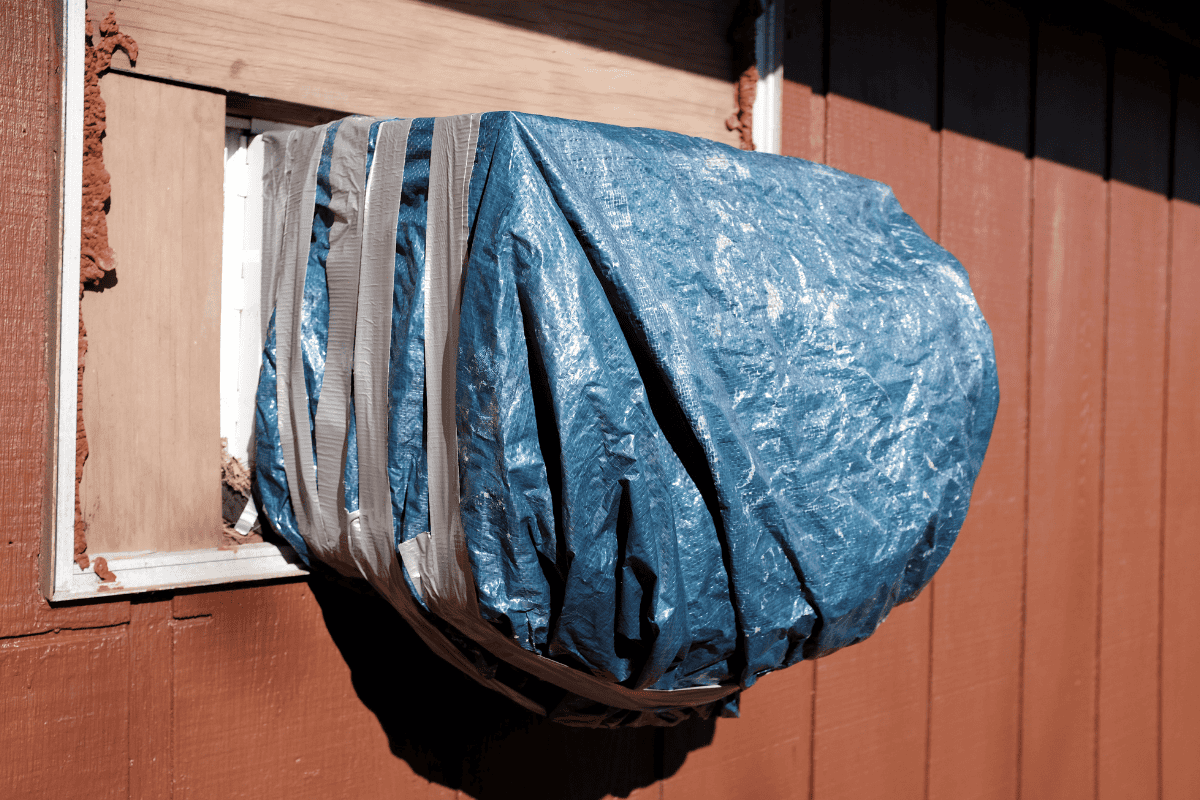
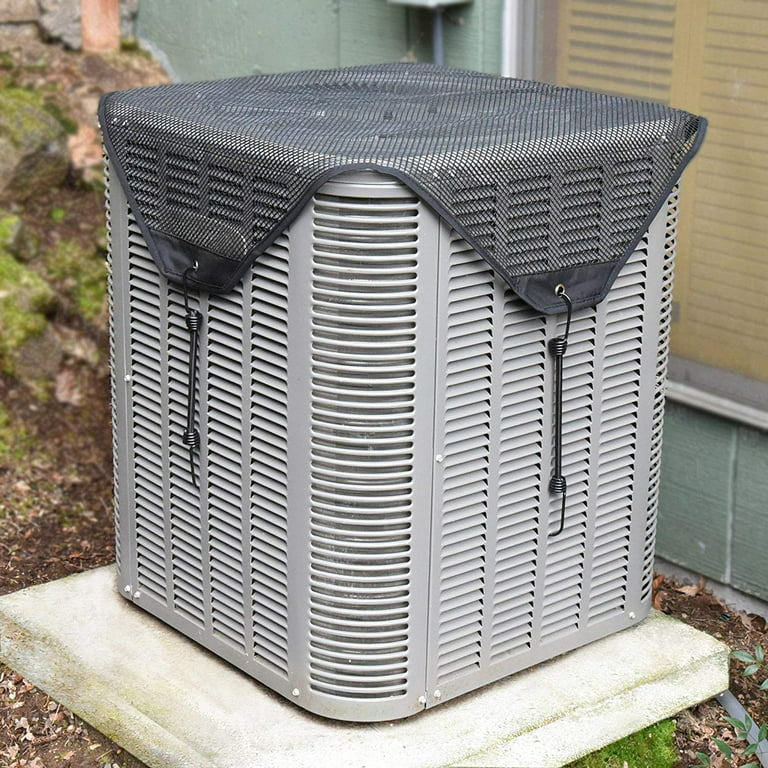
![9 Reasons That Causes an AC Unit to Freeze Up: [Troubleshooting Guide]](https://hvacangel.com/wp-content/uploads/2024/05/what-causes-a-ac-unit-to-freeze-up-1024x683.png)
